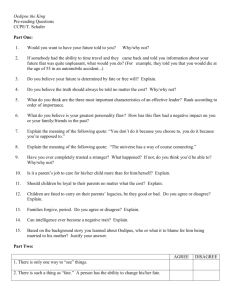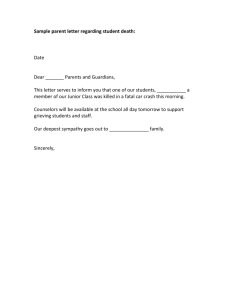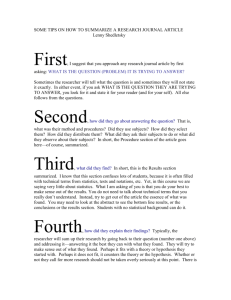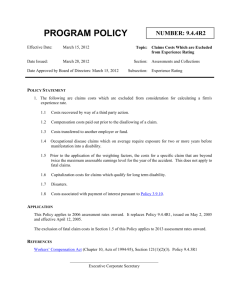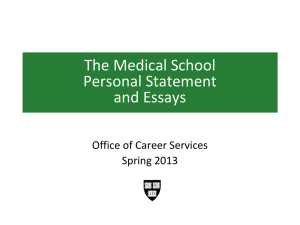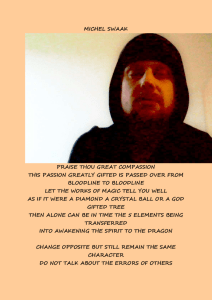5 Fatal Flaws - Accepted.com
advertisement
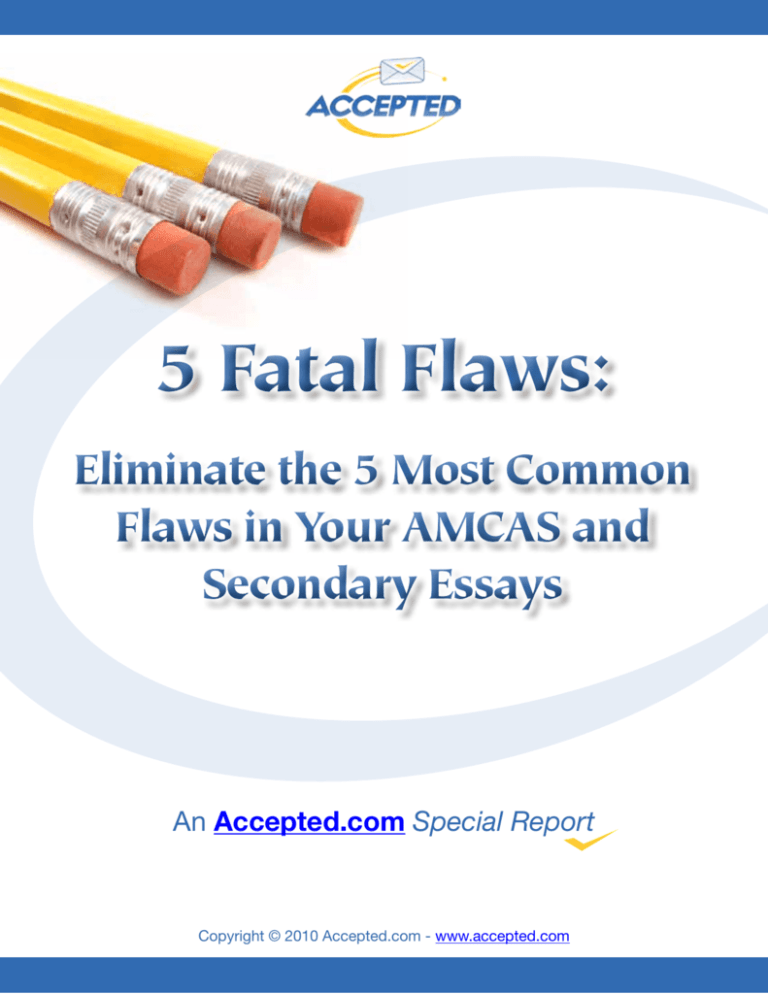
5 Fatal Flaws: Eliminate the 5 Most Common Flaws in Your AMCAS and Secondary Essays An Accepted.com Special Report Copyright © 2010 Accepted.com - www.accepted.com 5 Fatal Flaws: Eliminate the 5 Most Common Flaws in Your AMCAS and Secondary Essays Table of Contents Fatal Flaw #1: Lack of Substance................................................................................................... 3 Fatal Flaw #2: Failure to Answer the Question.............................................................................. 4 Fatal Flaw #3: Clichéd Writing....................................................................................................... 5 Fatal Flaw #4: Superficiality........................................................................................................... 6 Fatal Flaw #5: Muddled Thinking.................................................................................................. 7 Epilogue.................................................................................................................. 8 -2Copyright © 2010 Accepted.com 5 Fatal Flaws: Eliminate the 5 Most Common Flaws in Your AMCAS and Secondary Essays Fatal Flaw #1: Lack of Substance Writing about nothing tends to bore, like a trite sitcom or movie with no plot. They lack substance and so will your essay if it isn’t based on: • Substantive self-reflection. • Use of specifics, examples, and anecdotes. • Willingness to reveal your thought processes and feelings. So start your writing process with self-knowledge. You don’t have to search the internet or a large library. Start with your experiences and your dreams. Search your head and your heart. That is where the substance of a good personal statement is stored. Then use anecdotes, specifics, and examples to reveal what’s in your heart and show that your dreams are grounded in experience. Good examples can bring your essays to life and engage the reader. At the same time, recognize that essays with only examples and anecdotes don’t reveal your thought processes and consequently are also superficial. Make sure you balance your stories with insight and analysis. Avoid Fatal Flaw #1: Bring your personal statements to life with self-reflection and astute use of examples balanced by analysis. -3Copyright © 2010 Accepted.com 5 Fatal Flaws: Eliminate the 5 Most Common Flaws in Your AMCAS and Secondary Essays Fatal Flaw #2: Failure to Answer the Question This is such a common error! Applicants so many times ask, “What does the admissions reader want?” They want the answer to their question. And too frequently you don’t provide what they want. If the question asks you to discuss a failure, somewhere in that essay you must discuss a time when you really blew it. And then what you learned, and if appropriate, a nice dose of how you successfully handled a similar subsequent situation. But the starting point has to be an answer to the question posed. If the question asks why you want to attend a given program, you need to provide specifics about that program that relate to your interests and goals. Don’t respond with an answer that could apply to all programs in your field. That is a non-answer, non-starter, and probable ding. Don’t tell them why you are more qualified than anyone else to attend their program. Just answer the question. What if it’s an open-ended question with just general instructions? Then follow the general instructions and enjoy the luxury of writing about what interests you and best presents your qualifications. Avoid Fatal Flaw #2: Keep the application alive. Answer the question. -4Copyright © 2010 Accepted.com 5 Fatal Flaws: Eliminate the 5 Most Common Flaws in Your AMCAS and Secondary Essays Fatal Flaw #3: Clichéd Writing Don’t hide your lucid answers to essay questions behind meaningless verbiage and abused clichés. I once read an interview with a recent grad. (To protect the guilty, I won’t link.) “As a new company in a new space, we need to exceed client expectations, so first and foremost I drive client projects in the health-care and telecom verticals. But my job requires an internal focus as well, and I spend a ton of time both building and updating scalable systems, from knowledge management to invoicing and payroll.” Ouch!!! I suppose this fellow is highly intelligent, and I hope he is good at what he does, but don’t write as he talks. Write directly and clearly so people can understand you. Can the buzz! Perhaps a translation would be: “As a new company entering a new market, we need to impress our clients with outstanding performance. I personally manage projects for clients in the health-care and telecom industries. But in addition to serving our clients, I am striving to build our business by ensuring that all our systems from personnel to invoicing support our growth.” For more on what real writers (and readers) think of the latest in vapid jargon, please see: • “Rid the World of Solutions”1 • “Attack of the Zombie Copy”2 • “Personal Statement Clichés of the Year”3 Avoid Fatal Flaw #3: Write pointed and direct answers to the questions. 1 http://www.businessweek.com/the_thread/blogspotting/archives/2005/11/rid_the_world_o.html?campaign_id=rss_blog_blogspotting 2 http://www.alistapart.com/articles/zombiecopy 3 http://blog.accepted.com/acceptedcom_blog/2006/10/26/personal-statement-tip-cliches-of-the-year.html -5Copyright © 2010 Accepted.com 5 Fatal Flaws: Eliminate the 5 Most Common Flaws in Your AMCAS and Secondary Essays Fatal Flaw #4: Superficiality When you write superficially you tend to blend into the great mass of applicants who on a superficial level are very much like you. They have the same goal. They have prepared similarly to gain acceptance. Of course, blending in is exactly what you don’t want to do. How can you distinguish yourself? Use specifics to tell your unique story and portray yourself distinctively. As my colleague in MBA Admissions Advantage, Maxx Duffy, says, avoid “umbrella words.” Umbrella words are words that have broad definitions and represent desirable qualities in the admissions process. Take “leadership,” for example. Yes, you want to demonstrate leadership. But you don’t want to do so by blabbing on and on about your leadership qualities. You want to provide an example that shows you in a leadership role and break down your role into sub-categories of leadership that were key to your success. For example, some components of leadership that you can focus on: 1. Listening. 6. Organizing. 2. Initiating. 7. Establishing a goal or vision. 3. Mentoring. 8. Motivating. 4. Teaching. 9. Managing. 5. Persuading. 10.Obtaining buy-in. And this is just a sample. Not all leaders can claim these qualities and only a handful can write about the specific example you will provide. So remember: • Avoid umbrella words. • Use specific examples. And banish superficiality from your personal statements. Avoid Fatal Flaw #4: Use specific examples to distinguish yourself. -6Copyright © 2010 Accepted.com 5 Fatal Flaws: Eliminate the 5 Most Common Flaws in Your AMCAS and Secondary Essays Fatal Flaw #5: Muddled Thinking I am not sure why I made muddled thinking the last flaw. Good writing starts with good thinking and ends with lots of editing, but editing is a topic for another series. Let’s stick with thinking in this tip. One of the biggest causes of muddled thinking: Writing what you think the admissions committee wants to read as opposed to what you want them to know. In fact, most admissions committee members believe that is the most common mistake applicants make. A point to consider: When adcoms receive thousands of essays, each one enumerating the A-Z of what applicants think their readers want to hear, it can get boring, not to mention annoying. The person who writes, “I am a 24-year old Indian male Engineering major who graduated Summa Cum Laude, participates in quizzes, and plays cricket,” is impressive, but needs to pep it up a bit. Even someone who doesn’t possess a heavily-represented profile can’t simply rely on the facts. “I am a goat shepherding woman from the Chilean coast,” sure is unusual, but unless you continue and express HOW that strengthens your candidacy as a student at a top graduate program, then it’ll sound just as drab as the first example to the exhausted person reading your essay. You want to write what adcoms want to hear? Fine. Answer their questions keeping in mind that they want to hear about YOU, about your individual experiences, about what makes you tick. This is not the place to reel off your accomplishments (they belong in your resume) or to discuss your professional or ethnic profile. Your essay is where you transform from being the straight-A, leadership-driven, analytical graduate school applicant number 658, to a person, a human being. With a voice. With a passion. And with something important to say. Much of making a compelling case depends on making connections. A connection between your past and your present. Or your present and your future. Your interests and your activities. Your passions and your commitments. Those connections reflect clear thinking and propel persuasive writing. An inability to connect the dots of your life creates doubts and questions in the reader’s mind. And when in doubt, the easiest step for a harried reader at a school receiving five or more applications for every seat in a class is to DENY. Before you put pen to paper or finger to keyboard, think about what you want to say clearly and critically. Your dreams are important. As I said in “Lack of Substance,” examine your head and your heart. Just make sure your head is in good working order when it listens to your heart. Avoid Fatal Flaw #5: Think clearly and honestly before beginning to write. -7Copyright © 2010 Accepted.com 5 Fatal Flaws: Eliminate the 5 Most Common Flaws in Your AMCAS and Secondary Essays Epilogue We hope that our 5 Fatal Flaws: Eliminate the 5 Most Common Flaws in Your AMCAS and Secondary Essays special report will guide you through the application maze. If you are still not confident about your ability to write effective personal statements, or just want to save your time and nerves, please contact Accepted.com.4 While our experienced professional editing staff won’t write your essays for you, we can help you5 from the beginning, as you’re defining your topics and themes, or we can edit your essays6 to ensure that your application is as strong as it can be. If you have any questions about this report, or questions about admissions in general, please feel free to post them to our Facebook wall.7 We would be happy to answer your questions! 4 5 6 7 http://info.accepted.com/service-request?Requested_Editor__c= http://www.accepted.com/services/medicalservices.aspx http://www.accepted.com/services/medicalservices.aspx http://www.facebook.com/Accepted#!/Accepted?v=wall -8Copyright © 2010 Accepted.com

